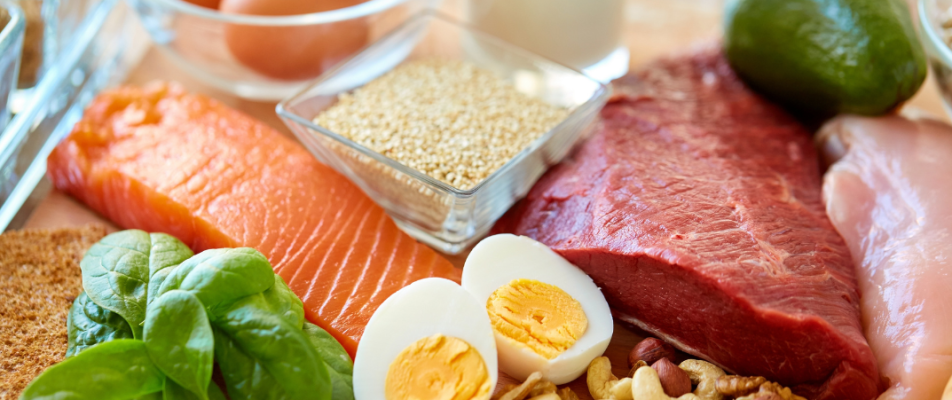
Protein-Rich Breakfasts
Morning Meals to Help You Lose Weight, Maintain Weight + Age Gracefully
Protein is a macronutrient that gives you feelings of well being and fullness after a meal. That feeling of balance, that allows you to go on with your day and not think about food for a while, is crucial. It curbs mindless snacking, which helps with weight loss and maintenance.
Protein gives you the ability to keep or gain muscle and the building blocks for body repair. It supports aging muscles, helps to burn more calories, and even assists good gut health. It increases metabolism and does lots of other things.
More research has recently been revealed on how much protein you need for that healthy baseline. The consensus: You need more protein than we once thought.
How Much Protein Should You Eat?
Depending on how much you weigh and what your wellness goals are, it’s pretty safe to assume that around 30g of protein at breakfast is a good target for general health and those feelings of wellbeing we just talked about. If you are moderately active to very active, the number rises to 65g all the way up to 100g a day, which is harder to get. That means eating protein with intention 4x a day.
The formulas are: 1.1–1.4g protein/kg of body weight for a relatively sedentary person. For general exercise and fitness and/or healthy aging, this goes up to 1.4–1.8g/kg of body weight.
Protein for Blood Sugar Balance
In some cases less than 30g of protein may just not be enough to suppress food intake later in the day due to more blood sugar swings. We all have had that feeling of blood sugar dipping and grabbing a simple unhealthy mid-morning or afternoon snack. Eating a protein-rich breakfast ensures that won’t happen. For most people, shooting for 30ish grams of protein at every meal (3-4 meals per day) is a good target range to keep you from falling off the blood sugar cliff.
Protein + Kidney Health + Water
Is more protein hard on your kidneys? Or is it actually healthy for kidneys to focus on more protein? Research is showing 30g/meal and even more is safe and healthy, with no adverse kidney side effects, but if you have any kidney issues, you’ll want to check with your doc before you change your current habits.
You should always make sure to drink a lot of water with a higher protein intake. Higher protein intake DOES increase the amount of urea and other waste that your kidneys remove through the urine. Which might make you feel thirstier. And even if you’re not thirstier, you should drink more water to help your kidneys process the extra protein.
Plant vs. Animal Protein
Proteins come in both animal and plant forms and complement each other nutritionally. I think we should eat both kinds unless you have a physical, emotional, mental or philosophical reason to NOT eat plants and animals.
Animal proteins tend to have good amounts of omega-3 fatty acids, vitamins and minerals that are readily used for build and repair. Plant-based proteins provide good amounts of phytochemicals, flavonoids and other anti-oxidants that quell inflammation and beautifully feed our microbiome. Both plant and animal proteins should be used as part of a whole-foods diet to meet all of your essential amino acid and other nutrient needs.
Protein Powders + Bars
If you’re struggling with getting enough protein in your diet by eating real whole foods, a protein powder can be very useful as long as it’s free of chemicals and dyes. Also, collagen peptides are a good option to assist in upping your daily protein intake. Same thing goes for protein bars.
Easy Protein Adds:
- Yogurt, whole milk, plain, greek-½ cup, (18gP)
- Cottage cheese, whole milk, ½ cup (13gP)
- Seeds – 1 ounce: Chia seeds (5gP), pumpkin seeds (9gP)
- Nuts – 1 ounce: Pistachios (6gP), cashews (4gP)
- Nut Butter – 2 tbsp: Peanut butter (7gP), almond butter (6gP)
- Hard-boiled eggs – 1 large, (6gP)
- Whole grains – ½ cup: oats (5gP), quinoa (4gP)
- Beans -1 cup: Black (15gP), chickpea (18gP), lentils (18gP)
- Cheeses -1 ounce: parm (10gP), mozzarella (whole, 6gP), if dairy is tolerated
Protein-Rich Recipes: Sweet Breakfasts
Protein Pancakes
Serving size 3 pancakes, protein 30g
1 cup oats
1 banana
4 eggs
1 teaspoon baking powder
a pinch of salt
a pinch of cinnamon
1–2 scoops protein powder (about 1/4 cup)
2 tablespoons flax meal
Mix everything in the blender and cook with a nonstick skillet. These freeze well. Just pop them in the toaster for a quick breakfast. Top with 2 tbsp of your favorite nut butter.
Protein Smoothie
Protein 21-39g
1/2 cup frozen strawberries (or other berry)
1-2 cups almond milk or nut milk of your choice
3 scoops protein powder (30gP) or 2 scoops collagen powder (22gP)
1 big handful of spinach
2 tbsp hemp hearts
A couple of shakes of cinnamon
Handful of ice. Blend.
Protein-Rich Recipes: Savory Breakfasts
Egg, Veggie, Sausage Scramble
Protein 26g
2 tablespoons butter
3 links breakfast chicken sausage (13g)
2 large eggs (12g)
1 cup chopped + sautéed veggies (Leftover onions and peppers and/or a handful of baby spinach work well)
Salt + pepper to taste
Scramble and enjoy!
Avocado Toast
Protein 30g
1 slice whole wheat toast
¼ avocado
3 ounces smoked salmon
1 fried egg
Sources: drruscio.com; The longevity book, Fong and Dinicolantonio; christinegarvin.com; pinchofyum.com
